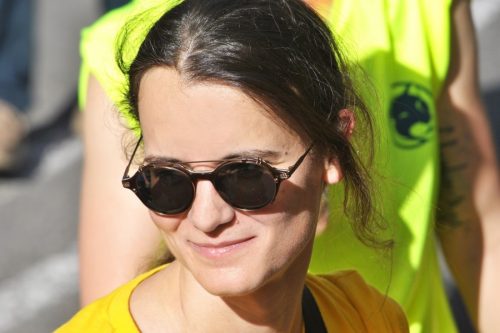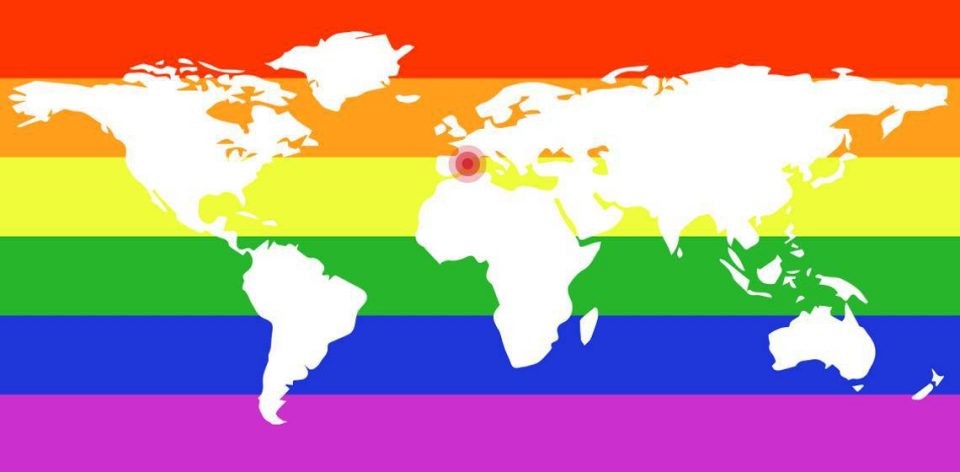In the last interview of the year, we are presenting to you Georgina from Barcelona. She is a member of an LGBTQ+ sports association and organizer of a women-only sports event, Donasport. Let us hear her talk about her project and Barcelona.
Can you introduce yourself please?
My name is Georgina Rufo Subietas and I live in Barcelona, the capital of Catalonia. I have always lived and worked here. Currently, I am a Catalan proof-reader at the Language Services of the University of Barcelona.
I love reading, learning languages, playing the saxophone, practicing sports, taking long walks with my dog Bacus, and spending quality time with my family and my girlfriend (well, she’s already a family member!). Since September 2016 I have been a member of Panteres Grogues, a LGBTQ+ sports club based in Barcelona. I was a member and coordinator of the rowing team for two years (2016-2018) and I joined the governing board for another two years (2017-2019) as Institutional Representative. Since 2017, I have also been involved in Donasport, a sports, cultural and leisure project organized annually by the female members of Panteres Grogues to promote the practice of sports among women and the inclusion of the LGBTQ+ community in sports.
When will it be in 2020 and what sports will you feature? Our community may be interested to join.
Donasport will start on March 6 (with the opening ceremony) and it will end on May 23 (with the closing party). There will be basketball, beach volley, paddle tennis, pool, soccer and table tennis tournaments, and some other activities, such as cycling, hiking and yoga. You will find all the info on our website.

We’ll surely check it out. Now tell us: how is it to be an LGBTQ+ in Catalonia or Spain?
The general situation of the LGBTQ+ community in Catalonia (and in Spain) is quite good, at least if compared with other (nearby and not nearby) countries. In 2005 the Spanish government legalized same sex marriage. Also since 2005 same sex couples have been able to even adopt. The problem is that most countries do not allow us to adopt “their” children. In 2014, the Catalan government approved a law that protects the rights of the LGBTQ+ community; in fact, in our government there is a department called Direcció General d’Igualtat (“Equality General Management”) which covers the LGBTQ+ as well. So we can say that the situation is very good and that it is easy to be yourself.
But we must be careful because living in the city is not like living in the countryside where on paper people have the same rights but there are no LGBTQ+ organizations around, so the media often reports attacks against LGBTQ+ people. Furthermore, I would say that being a lesbian is harder than being gay: in a hetero-patriarchal system such as Spain’s, women are always in the background, in a secondary place, and men have always had more visibility than women.

Sadly it sounds very familiar. Can you talk a bit about Barcelona? How is LGBTQ+, or more specifically lesbian*, social life in BCN?
The situation in Barcelona is very good. There is an “LGTBQ+ neighborhood” near the city center: there are LGBTQ+ bars, restaurants, saunas, clothing shops, cake shops, organizations. You can see not only places but also same sex couples in this neighborhood and actually all over the city. At the same time, lesbian social life is not so visible. There are maybe just a couple of lesbian bars (while there are many gay bars). There are lesbian groups, organizations and businesses (Catalan Association of Lesbian Entrepreneurship, In Out Radio, Bollo&Butter, Gaviotas Group, for example), but many of them are not widely known. There are also some lesbian parties and events, but again they are not very popular. Lesbians do take part in Pride, but the great concentration of gay men makes us almost invisible.
So, to sum up, it is not too hard to be an LGBTQ person in Barcelona, but to be a woman (hence a lesbian) is always a bit more difficult.
That’s right.

Finally, can you share a memorable coming out stories of yours?
I never really “came out” in the classical sense; I always acted as if it was natural and family members, university friends, band members, work mates, etc. reacted so.
Nevertheless, I had the strangest incident with a gay friend who had been rowing with me. After a couple of months asked me during a personal conversation with another friend: “But, Georgina, are you lesbian?!” Can you imagine my face?! We both were in the LGBTI rowing team of Panteres Grogues! I answered “Yes! Why did you think that I was straight?” He answered: “Well, you have long hair, you wear earrings… you are feminine!” That killed me. A gay man was the first (and the only, by now) to openly show such a stereotyped mind to me (probably other people also think like him but they have enough consciousness of their prejudices and do not say this type of —stupid— things).

